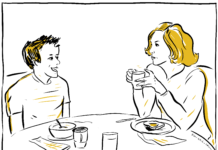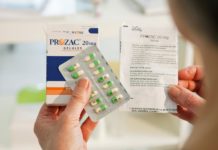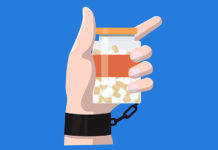Two Years Tapering an Antidepressant – A Life-Changing Experience That I Didn’t Want
My heart goes out to anyone experiencing withdrawal, but especially those who are so ill they can’t work and are struggling to navigate a heartless and cynical ‘benefits’ system. Their only crime is to have experienced difficulty from a prescribed treatment, yet they are treated as medical pariahs.
Psychotropic Medications Serve as Powerful Tools for U.S. Military, Imperialism
Ethnographic research sheds light on extensive psychopharmaceutical use by soldiers in post 9/11 U.S. wars.
Are Antidepressants Enabling the Population to Tolerate the Intolerable?
Just how sad is our current state of affairs that it causes so much of the population to feel depressed and/or anxious? Just how much are these drugs changing the state of our society as a whole? Are the drugs desensitizing the population to the point that it will tolerate social conditions it would otherwise find intolerable?
Children Taking ADHD Drugs More Likely to Take Antidepressants as Teens
Adhering to a commonly prescribed medication for ADHD in children is associated with higher chances of being prescribed antidepressants in adolescence.
Exposure to Antidepressants in the Womb Linked to Autism
Researchers, publishing in Toxicology Research, review the evidence that antidepressant exposure in the womb is linked to autism spectrum disorders (ASD) in humans.
Exposure to Antidepressants in the Womb Linked to Autistic Behavior in Mice
Researchers experimenting on mice found that exposure to fluoxetine (Prozac) in utero resulted in behaviors considered in animal studies to be analogous to autism in humans.
Antidepressant Use Linked to Longer, More Frequent Psychiatric Rehospitalization
New study finds that antidepressants may negatively impact recovery after psychiatric hospitalization.
The Impact of Regression to the Mean in Psychiatric Drug Studies
Could the statistical phenomenon of regression to the mean be responsible for the dramatic effects of placebo—as well as the supposed effectiveness of some psychiatric drugs?
More Psychological Supports Needed to Manage Antidepressant Discontinuation
Study reviews psychological interventions for antidepressant discontinuation.
Withdrawal Symptoms Routinely Confound Findings of Psychiatric Drug Studies
Researchers examine how rapid discontinuation can mimic the relapse of mental health symptoms and confound psychiatric drug studies.
The Effects of Antidepressant Exposure Across Generations: An Interview with Dr. Vance Trudeau
Dr. Vance Trudeau discusses his study's finding that antidepressants may have far-reaching, adverse effects that last up to three generations.
Ambushed by Antidepressants for 30 Years
They helped me function for a while, but the debilitating side effects of antidepressants held me prisoner. I'm still having a hard time understanding how this could have happened. It's been suggested to me by a therapist that what I'm going through now is another kind of PTSD: the ongoing trauma of realizing what antidepressants did to me for 30 years.
Combining Mirtazapine with Existing SSRI or SNRI Does Not Improve Depressive Symptoms
Study finds combining mirtazapine with an SSRI or SNRI is not clinically effective for improving depression in primary care patients who remained depressed after taking an SSRI or SNRI.
Does Active Placebo Response Explain Antidepressant Results?
A new study investigated whether participants guessing if they have an antidepressant or placebo affects response rates.
Peer-Support Groups Were Right, Guidelines Were Wrong: Dr. Mark Horowitz on Tapering Off Antidepressants
In an interview with MIA, Dr. Horowitz discusses his recent article on why tapering off antidepressants can take months or even years.
Very Slow Tapering Best For Antidepressant Withdrawal
A new article in Lancet Psychiatry finds that slower tapering of SSRIs is better for preventing antidepressant withdrawal effects.
Psychological Interventions Can Help When Tapering Off Antidepressants
Meta-analysis of antidepressant tapering finds CBT and MBCT can aid in tapering, but limited studies met inclusion criteria.
New Study Finds Limited Effectiveness for Antidepressants After Stroke
The researchers found that although antidepressants had a slight short-term effect on reducing the likelihood of depression diagnosis, there was no long-term improvement, nor any improvement in motor functioning.
The War on Antidepressants: Why We Need to End it for Public Benefit
In the interest of the patients who are currently experiencing withdrawal reactions and the many more who will suffer withdrawal effects in the future, we need to end this “war.” Academic psychiatry must address these problems and conduct thorough research on withdrawal reactions.
How Long Does Antidepressant Withdrawal Last?
The patient experiencing the pain of withdrawal believed that they would feel better when they stopped taking their antidepressants. After all, they’re under the care of a board-certified medical professional who has vowed to do no harm. But despite those reassurances, they find themselves in a world of hurt.
Researchers Challenge Interpretation of Antidepressant Meta-analysis
Researchers question the overstated results of a large antidepressant meta-analysis and point to cultural pressures to turn to these drugs for a quick fix.
Antidepressant Withdrawal: An Unknown Disorder?
Antidepressant withdrawal is no longer an unknown disorder since knowledge on this topic has grown enough to be translated into practice. As proposed by George Engel in 1977, medical doctors, including psychiatrists, can observe and listen to their patients and develop a program to treat withdrawal and restore health.
Flexible Treatment Planning Improves Depression Outcomes in Youth
Researchers explore the effects of augmented treatment at various points in interpersonal psychotherapy for adolescents diagnosed with depression, highlighting previously unidentified critical decision points (i.e., relatively early in the treatment sequence).
Study Links Antidepressants and Decreased Coping Behaviors Across Generations
Biologists found that exposure to antidepressants suppresses important survival behaviors in zebrafish, an effect that persisted across three generations and was found to be more severe for males.
The Good, the Bad, and the Ugly: An Infographic on Bipolar Drugs
Bipolar drug therapy is a balancing act of benefits vs. harms. Odds of attributable benefit cluster in a 15-25% band, so 75%-85% don’t see substantial benefit. Stated differently, if five people take a bipolar drug, only one is likely to see substantial improvement due to it, but all five will have side effects.

































